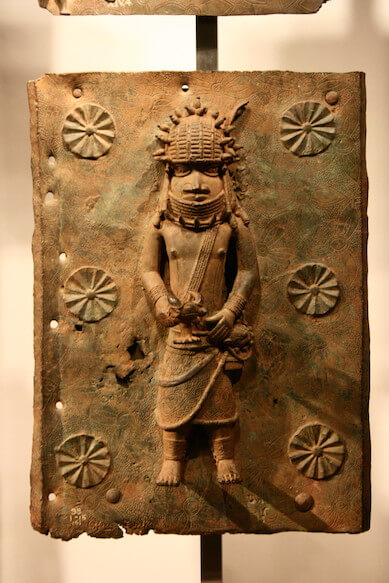Every day for 30 days we will be featuring a museum object that has inspired or intrigued us, in the hope that “an object a day keeps the doctor away.” We love creating exciting, meaningful storytelling through engaging experiences, but still firmly believe that it is hard to beat the thrill of being in the presence of authentic artefacts. Today’s object is: the Benin bronzes.

The Benin bronzes embody the fraught relationship between colonial collectors and their countries of origin. That tension is part of their story.
Brass was associated with kingship in the Benin empire (1180-1897) and plaques, cast by the lost-wax process, were used to cover the wooden beams that supported the roof in the royal palace, the centre of religious activities that controlled the well-being of the entire empire.
The Benin bronzes depict scenes of court life and ritual which involve rulers, warriors and officials. European adventurers and traders, who sold the metal from which the plaques were cast, also appear and local interest centred on their long hair, hooked noses, dress and weapons.
In 1897, British troops looted some 4,000 sculptures after invading the Kingdom of Benin (now southwestern Nigeria). More than a century later, over a 1,000 of the bronzes are held at museums across Europe, with the largest collection of 700 at the British Museum in London; but not in Nigeria, their country of origin. Nigerian governments have sought their return since the country gained independence in 1960.
There have been an increasingly vociferous calls from various countries for restitution of their artifacts from institutions such as the British Museum (including notably the Elgin Marbles). In the case of the Benin bronzes, the best offer made has been one of a loan. However, passions are still running high with the Modern Ghana news outlet as recently as 5th April 2020 saying that “selfishness, greed, and racist arrogance seem to rule in Western museum circles.”
The Benin bronzes are an interesting example of how objects take on meaning other than their original function or aesthetic value. They represent colonial interactions that still resonate today and inspire responses from artists such as George The Poet.
The British Museum is temporarily closed. Check website for details.
